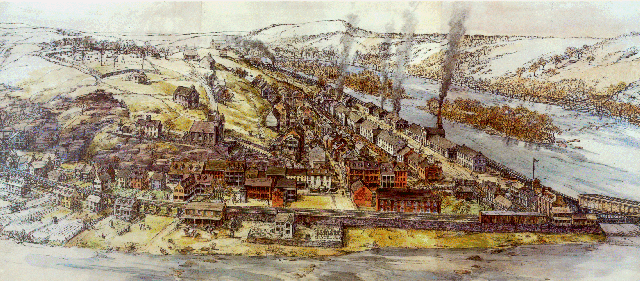
This account originally appeared in the Century Magazine 26, (July, 1883): 399-411. It was followed by F. B. Sanborn's "Comment by a Radical Abolitionist": 411-415. Unless noted, illustrations are not from the originial article.

STORER COLLEGE, at Harper's Ferry, West Virginia, a flourishing institution "for the education of colored youth of both sexes," owes its existence to the philanthropic gentleman of New Engand whose name it has taken. At its fourteenth annual commencement on May 30, 1881, Frederick Douglass, who is un- doubtedly the most gifted orator of his race, delivered a eulogistic address on old John Brown, in which he claimed for him " the honor" of having originated the war between the Northern and Southern sections of our Union,-summing up his conclusions on this point in the following expressive language: "If," said he, "John Brown did not end the war that ended slavery, he did, at least, begin the war that ended slavery. If we look over the dates, places, and men for which this honor is claimed, we shall find that not Carolina, but Virginia,-not Fort Sumter, but Harper's Ferry and the arsenal,-not Major Anderson, but John Brown began the war that ended American slavery, and made this a free republic. Until this blow was struck, the prospect for freedom was dim, shadowy, and uncertain. The irrepressible conflict was one of words, votes, and compromises. When John Brown stretched forth his arm the sky was cleared,-the time for compromises was gone,-the armed hosts of freedom stood face to face over the chasm of a broken Union, and the clash of arms was at hand."
These words, uttered with an emphasis belonging to a strong conviction of their truth, will be accepted by the public as an authentic but somewhat tardy confession of one who, as a confidential coadjutor of Brown in his conspiracy against the South, is understood to have been fully acquainted with his plans and purposes; and the avowal thus frankly made by him is sufficiently confirmed by the contemporaneous facts to which it refers. For, when a complete and impartial history of our late civil war shall be written, it will be seen that the "John Brown Raid," at Harper's Ferry, in the latter part of 1859, was indeed the beginning of actual hostilities in the Southem States; that then and there the first shot was fired and the first blood was shed-the blood of an unoffending free negro, foully murdered while in the faithful discharge of his duty! It will be further seen that there and then occurred the first forcible seizure of public property; the first attempt to "hold, occupy, and possess" a military post of the Government; the first outrage perpetrated on the old flag; the first armed resistance to national troops; the first organized effort to establish a Provisional Government at the South, in opposition to that of the United States; the first overt movements to subvert the authority of the constitution and to destroy the integrity of the Union.
Looked at in the light of subsequent events these facts,with their antecedent and attendant circumstances, are so significant that few now can fail to see and none need hesitate to say that "the abolition affair at Harper's Ferry," in the fall of '59, was an appropriate prelude to that gigantic war which was so soon to follow it, and which, conducted on a scale commensurate with the magnitude of the work to be accomplished, effectually completed what old John Brown so fatally began -a work concerning which the friends of Brown now boast that "Lincoln with his proclamations, Grant and Sherman with their armies, and Sumner with his constitutional amendments, did little more than follow in the path which Brown had pointed out." [F. B. Sanborn, in "Atlantic Monthly," April, 1875.] But whatever difference of opinion yet exists as to who fired the first hostile gun in the South,-John Brown or General Beauregard, -one thing is certain: If it had not been for a comparatively small class of factious and implacable politicians in both sections,-the active abolitionists of the North and the secessionists per se of the South,-there would have been no fratricidal civil war, especially if it had depended on the aforesaid extremists to go to the front and do the fighting. But it is enough for us to know what was actually done during a maddened and misguided epoch and what our obvious duty is in these improving times of restablished peace, and, it is to be hoped, restored fraternity.
Passing by the question then, as to whether the Harper's Ferry outbreak was "a legitimate consequence of the teachings of the Republican party," as was claimed at the time of its occurrence by some of the prominent leaders of that party; disregarding also the kindred inquiry as to whether the forcible extinction of slavery in the South was the logical consummation of a foregone conclusion in the North, where it had long been labored for by a constantly increasing faction, who, professing to be governed in their political action by a "higher law" than the constitution, were willing to "let the Union slide " for the sake of abolition, and who, likewise, on that account, opposing all compromises, persistently urged war at a time when many patriots, North and South, were nobly striving to avert that calamity,-I will confine myself here to outlining some of the scenes and incidents that occurred, partly under my personal observation, at the time of Brown's hostile incursion, for which he and his deluded followers paid the forfeit of their lives, and from which the people of the unfortunate town selected for his midnight raid may date the beginning of the end of their former prosperity.
On the morning of the raid, Monday, Oct. 17, 1859, I was at my home near Shepherdstown (ten miles west of Harper's Ferry), and had hardly finished breakfast when a carriage came to the door with one of my daughters, who told me that a messenger had arrived at Shepherdstown, a few minutes before, with the startling intelligence of a negro insurrection at Harper's Ferry!
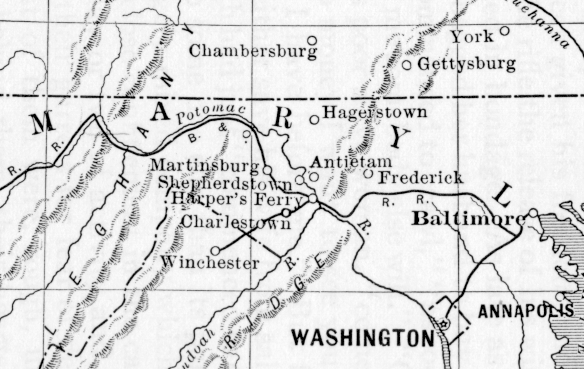
She could give no particulars, except that a number of armed abolitionists from the North-supposed to be some hundreds- had stolen into "the Ferry " during the previous night, and, having taken possession of the national armories and arsenal, were issuing guns to the negroes and shooting down unarmed citizens in the streets. Ordering my horse, I started at once for Harper's Ferry, by way of Shepherdstown, where I found the people very much excited. Their first feeling, on hearing the news, had naturally been one of amazed and, with some, of amused incredulity, which, however, soon gave place to an intense and pardonable indignation.
The only military organization of the precinct-a rifle company, called "The Hamtramck Guards "-had been ordered out, and as I rode through town the command was nearly ready to take up its line of march for the Ferry, while a goodly number of volunteers, with every sort of fire-arm, from old Tower muskets which had done service in colonial days to modern bird-guns, were joining them. I observed, in passing the farms along my route, that the negroes were at work as usual. When near Bolivar,-a suburb of Harper's Ferry,-I saw a little old "darky " coming across a field toward me as fast as a pair of bandy legs, aided by a crooked stick, could carry him. From the frequent glances he cast over his shoulder and his urgent pace, it was evident that the old fellow was fleeing from some apprehended danger, and was fearfully demoralized.
I hailed him with the inquiry:
"Well, uncle, which way?"
"Sarvint, marster! I'se only gwine a piece in de country for ter git away from de Ferry."
"You seem to be in a hurry," said I.
"Yes, sah, I is dat, an' it's 'bout time ter be in a hurry when dey gits ter shootin' sho 'nuff bullets at yer."
"Why, has any one been shooting at you?"
"No, not exactly at me, bless de Lord ! kase I didn't give 'em a chance ter. But dey's been a-shootin' at pleanty folks down dar in de Ferry, an' a-killen of 'em, too."
"Who's doing the killing?"
"De Lord above knows, marster! But I hearn tell dis mornin' dat some of de white folks allowed dey was abolitioners, come down for ter raise a ruction 'mong de colored people."
And on inquiring if any of the colored peo- ple had joined them, "No-sah-ree!" was his prompt and emphatic answer, at the same time striking the ground with his stick, as if to give additional force to the denial.
I insert this colloquy simply because it tends to illustrate the fears and feelings of the negroes at Harper's Ferry as well as in the surrounding region, at the time of Brown's abortive attempt to secure their aid. Somewhat relieved by the assurance that the negroes had nothing to do with the trouble, I continued on my way to Harper's Ferry, arriving a little before noon.
It is necessary here to give a summary of the day's doings up to the time of my arrival at the Ferry, together with a preliminary explanation of Brown's plans and preparations. From facts which are fully admitted by his friends, it is now known that for more than five and twenty years Brown had cherished the idea of making slavery "insecure " in the States where it existed by a preconcerted series of hostile raids and servile insurrections, and that at least two years previous to his raid on Harper's Ferry he had selected it as a suitable place for the initial attack. His three principal reasons for choosing the Ferry as his point d'appui were: (1) The presence of a large slave population in what is known as "the Lower Valley," which is that fair and fertile portion of the great valley of Virginia embraced within the angle formed by the Potomac and Shenandoah rivers before their confluence at Harper's Ferry; (2) the proximity of the Blue Ridge range of mountains, where, in their rocky recesses and along their densely wooded slopes, he would be comparatively safe from pursuit and better able to protect himself from attack; (3) because of the location at Harper's Ferry of the United States armories and arsenal, in which were always stored many thousand stands of arms without sufficient guard to protect them.
His plan was to make the Blue Ridge Mountains his base of operations and, descending from them at night with his armed marauders, to attack the unprotected villages and isolated farm-houses within his reach, wherever and whenever his incursions would probably be least expected.
These raids were to be made on the Piedmont side of the Blue Ridge, as well as in the Valley,-"his forces acting as infantry or cavalry," according to circumstances, and to have no scruples against taking the horses of the slave-holders and other needed property.
As many of the slaves as could be induced to abandon their homes were to be armed and drilled, and, by recruiting his "army of occupation " in this way, he expected soon to raise a large body of blacks, reinforced by such white men as he could enlist, with which he believed he could maintain himself successfully in the mountains, and, by a predatory war, so harass and paralyze the people along the Blue Ridge, through Virginia and Tennessee into Alabama, that the whole South would become alarmed and slavery be made so insecure that the slave-holders themselves, for their own safety and that of their families, would be compelled to emancipate their negroes. It was, also, a part of his plan to seize the prominent slave-owners and hold them prisoners either "for the purposes of retaliation," or as hostages for the safety of himself and his band, to be ransomed only Upon the surrender of a specified number of their slaves, who were to be given their freedom in exchange for that of their masters.
When Brown went to Europe in 1848, to sell Ohio wool, it is said that he inspected fortifications on the Continent, "with a view of applying the knowledge thus gained, with modifications of his own, to mountain warfare in the United States"; and though not much given to books, he read all he could get that treated of insurrectionary warfare. Plutarch's account of the stand made for years by Sertorius, the Spanish chieftain, against the combined power of the Romans, it is said, was frequently referred to by him in c onversation with his friends, as also the war against the Russians by Schamyl, the Circassian chief; that against the United States by Osceola, in the Everglades of Florida; and that so successfully fought by Toussaint L'Ouverture and Dessalines, in St. Domingo. He likewise regarded his own bloody experiences in Kansas as so many practical lessons on the skirmish line; and he also believed himself to be an appointed agent of Deity in the work he intended to do.
He allowed few of his friends besides his immediatc followers to know his plans; but there were certain pseudo-philanthropists in the North who knew all about them, and who now boast that, with a full knowledge of his intentions, they "were indifferent to the reproach of having aided him" with means for their execution. While the self-sacrificing bravery of Brown has a claim to our respect and admiration, however much we may condemn his unlawful and treacherous attack, Southern people can feel only abhorrence and contempt for the cowardly conspirators who encouraged his design without having the manliness to share its dangers.John Brown's first appearance south of Mason and Dixon's line was on June 30th, I859, at Hagerstown, in Maryland. Com- ing from Chambersburg, in company with a man named Anderson, who was one of his "lieutenants," they remained over night there, " passing themselves off for Yankees going through the mountains in search of minerals."
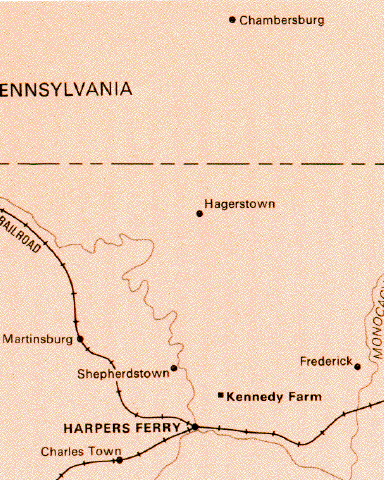
Subsequent conversations directed Brown's attention to a small tract further up the road, about five miles from the Ferry, belonging to the heirs of Dr. Booth Kennedy, and a few weeks later he rented a portion of it, includ- ing "the improvements," which consisted of a plain two-storied log-house with a high basement, and a small outhouse or shop, which was also of logs; for which, with the right to fire-wood and pasture for a horse and cow, he paid, in- advance, thirty-five dollars, taking the property until the first of March fol- lowing. The place was admirably adapted to the purposes of concealment, being somewhat remote from other settlements, surrounded by dense forests, with its houses some distance back from the rarely traveled public road in front of them, and almost entirely hidden from view by undergrowth.
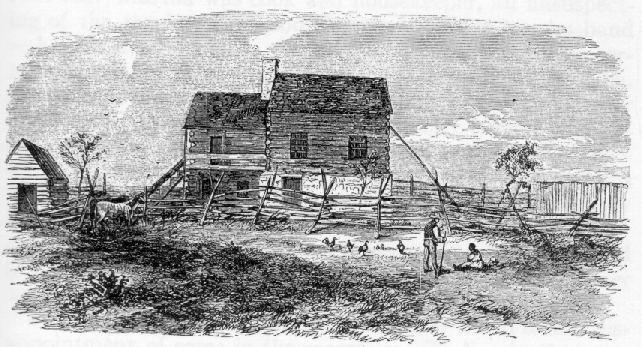
Having thus secured a suitable hiding-place, his men began to gather there,-coming from the North, one or two at a time, at intervals, and generally in the night. Meanwhile, there also arrived quietly from the same quarter- great precautions being used to conceal their destination as well as their contents-a number of boxes filled with guns, pistols, pikes, powder, and percussion caps, together with fixed ammunition, swords, bayonets, blankets, canvas for tents, tools of all kinds, maps and stationery,; so that few camps were ever more fully supplied for an active campaign than was Old John Brown's mountain aerie.
Sunday night, October 16th, was fixed for the foray; and at eight o'clock that evening, Brown said to his companions: "Come, men, get on your arms; we will proceed to the Ferry." They took with them a one-horse wagon, in which were placed a parcel of pikes, torches. and some tools. including a crow-bar and sledge-hammer, and in which also Brown himself rode as far as the Ferry.
Brown's actual force, all told, consisted of only twenty-two men including himself, three of of whom never crossed the Potomac. Five of those who did cross were negroes, of whom three were fugitive slaves. Ten of them were killed in Virginia; seven were hanged there, and five are said to have escaped, viz., two of those who crossed the river, and the three who did not cross. Six of the white men were members of Brown's family, or connected with it by marriage, and five of these paid the forfeit of their lives to the Virginians. Owen Brown is the only one of the whole party who now survives.
The following is a list of the party with their respective titles, according to commissions given them under authority of the "Provisional Government," which Brown intended to establish in the South, the constitution for which had been adopted by "a quiet convention," held in Canada for the purpose, over which Brown presided: John Brown, "commander-in-chief"; John Henry Kagi, "adjutant, second in command," and "secretary of war"; Aaron C. Stevens, "captain"; Watson Brown, "captain"; Oliver Brown, "captain"; John E. Cook, "captain"; Charles Plummer Tidd, "captain"; William H. Leeman, "lieutenant"; Albert Hazlett, "lieuten- ant;" Owen Brown, "lieutenant"; Jeremiah G. Anderson, "lieutenant"; Edwin Coppic, "lieutenant"; William Thompson, "lieutenant"; Dauphin Thompson, "lieutenant "; Shields Green; Dangerfield Newby, John A. Copeland, Osborn P. Andersen; Lewis Leary; Stewart Taylor; Barclay Coppic, and Francis Jackson Merriam. The three last named were left at the Kennedy farm as a guard, and did not cross the river; the five names italicized were colored men, and the only persons, among the actual invaders who did not hold commissions-all compliments of that kind having been monopolized by the white men the party, as a practical commentary on their professions of fraternity and equality. The army, so fully officered beforehand, was not yet raised. According to certain "general orders," issued by Brown, October 10th, a week before his raid, his forces were to be "divided into battalions of four companies, which would contain, when full, seventy-two men including officers in each company, or two hundred and eighty-eight in the battalion. Each company was to be divided into "bands " of seven men under a corporal, and every two "bands" made a "section" under a sergeant.
When Brown's party arrived opposite the Ferry at the entrance to the Baltimore and Ohio Railroad bridge over the Potomac,-
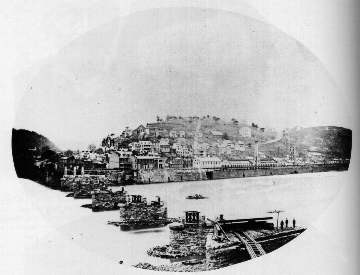
along the side of which there was, as now, a wagon road,-two of the number (Cook and Tidd) were detailed to tear down the telegraph wires, while two more (Kagi and Stevens), crossing the bridge in advance of the others, captured the night - watchman, whose name was Williams, and who was entirely too old to make any effective resistance. Leaving Watson Brown and Stewart Taylor as a guard at the Virginia end of the bridge, and taking old Williams, the watchman, with them, the rest of the company proceeded with Brown and his one-horse wagon to the gate of the United States armory, which was not more than sixty vards distant from the bridge.
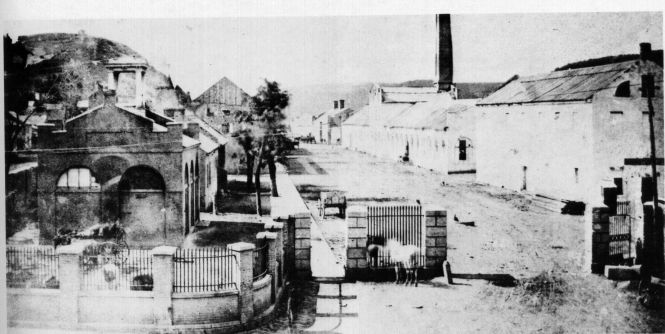
Finding it locked, they peremptorily ordered the armory watchman, Daniel Whelan, who was on the inner side of the gate, to open it, which he as peremptorily refused to do. In his testimony before the U. S. Senate committee, of which Mr. Mason of Virginia was chairman, Whelan described this scene so graphically that I here quote a part of it, as follows:
After telling how, with their crowbar and sledge, they broke the fastenings of the gate, Whelan went on to testify:
Edwin Coppic and Hazlett were next sent across the street to break into the United States arsenal, which stood within another inclosure and where there was no guard whatever; while, at the same time, Oliver Brown and William Thompson occupied the bridge over the Shenandoah near the arsenal, and Kagi, with John Copeland, went up the Shenandoah to the Government rifle-works, about half a mile above, where there was another superannuated and unarmed watchman to encounter, whom they likewise captured, and then they took possession of "the works."
It was now near midnight. Brown's next step was to dispatch Stevens, Cook, and others, six in all, to the country to capture my life-long friend and college-mate Colonel Lewis W. Washington, and also to kidnap his negroes. In capturing Colonel Washington, they also seized the historic dress-sword which had been given by Frederick the Great to George Washington, with the memorable words: "From the oldest soldier to the greatest" together with one of a pair of pistols presented by La Fayette to General Washington, and some other valuable arms. They brought Colonel Washington to Harper's Ferry in his own carriage, and his negro men in his four-horse farm-wagon,-stopping on their way at the house of another farmer, Mr. Alstadt, whom they likewise took prisoner, together with his son and men-servants, all of whom were taken under guard to Brown at the armory, arriving there before daylight.
In the meantime, the eastern-bound passenger train on the Baltimore and Ohio Railroad arrived at the Ferry after midnight, and was detained there until daylight by Brown's order, his son Watson stopping the train as it approached the station. The passengers were at a loss to comprehend the cause of the delay, some of them supposing it to be a strike of railroad hands, and others thinking it was an emeute among the armorers. While they were yet in ignorance of the real cause, an incident occurred at about half-past one o'clock which served sufficiently to show, at least, the murderous character of the insurgents.
Shepherd Haywood, one of the most respectable free negroes in the county and the regular railroad porter, employed to look after the luggage of passengers, had occasion to see the night-watchman, Williams, whose post of duty was on the bridge.
This was the first victim of the foray, and there is a suggestive significance in the fact that it was an inoffensive free negro, and that his assassination was as cowardly as it was cruel and uncalled for. This firing was the first intimation that any of the citizens of the Ferry had-except, of course, the captured watchmen-that there was an enemy in their midst. Several persons living near the bridge were awakened by it, some of whom got up and looked out of their windows to ascertain the cause. But as they heard nothing more, and it was too dark to distinguish objects a few feet from them, they concluded that the noise had been occasioned by midmgnt revelers shooting off their pistols in sport, and they returned to their beds.
One of these awakened citizens, however, Dr. Starry, was not so easily contented to lie down again without looking a little further into the matter, as he had heard a cry of distress following the shots, and his professional instincts prompted him to go to the relief of the sufferer. The wounded negro had managed to make his way back to the office of Mr. Beckham, the railroad agent, where the Doctor found him lying upon the floor, writhing in agony. After doing what he could to make him more comfortable, and having learned from him the circumstances under which he had been shot, the Doctor started out to investigate more fully the situation.
When he had watched the movements of the raiders for some time and from different points of observation, he was enabled to form an idea of what they had done and were then doing, though not of their ulterior designs; for he thought that their only object was robbery. With this idea in his mind he determined to arouse Mr. Kitzmiller, the chief clerk, who, in the absence of Colonel Alfred H. Barbour, the superintendent, had official charge of the armories. So, getting out his horse, he made his way to Kitzmiller's house, which was in quite a different part of the town; and having informed him of the condition of of things at the armory, he rode on to Bolivar and elsewhere, arousing the people as he went. By this time it was broad daylight, and some of the citizens were appearing in the streets. Such of them, in the lower part of the town near the Government works, as had occasion to pass down Shenandoah and High streets, were surprised to see them picketed near their intersection, and, as may be supposed, their surprise was not diminished on being rudely told they were prisoners and being unceremoniously marched to a building in the armory yard which Brown had appropriated as headquarters for himself and as a "calaboose" for his captives, of whom some thirty or forty altogether were thus taken and held by him.
One of the citzens by the name of Boerley, -a well-to-do grocer, and an Irishman by birth,-when walking quietly along not far from his residence, happened to get within range of a picket,-a black fellow who called himself Dangerfield Newby,-whereupon the negro raised his rifle and without a word of warning shot him dead, with as little compunction as if he had been a mad dog.
It was now about seven o'clock, by which time most of the people of the town had been warned of the raid and its real object. Accordingly, messengers were sent for assistance to the neighboring towns, while prompt and effective steps were taken by the citizens of the Ferry to resist the insurgents, whose force was supposed to be far greater than it really was, from the fact of Brown's making an ostentatious display of sentinels outside of the armory buildings while keeping up from their interiors a desultory fire upon the citizens, when any of them appeared in sight.
There was unavoidable delay in the preparations for a fight, because of the scarcity of weapons; for only a few squirrel guns and fowling-pieces could be found. There were then at Harper's Ferry thousands and tens of thousands of muskets and rifles of the most approved patterns, but they were all boxed up in the arsenal, and the arsenal was in the hands of the enemy. And such, too, was the scarcity of ammunition that, after using up the limited supply of lead found in the village stores, pewter plates and spoons had to be melted and molded into bullets for the occasion.
By nine o'clock a number of indifferently armed citizens assembled on Camp Hill and decided that the party, consisting of half a dozen men, should cross the Potomac a short distance above the Ferry, and, going down the tow-path of the Chesapeake and Ohio canal as far as the railway bridge, should attack the two sentinels stationed there, who, by the way, had been reinforced by four more of Brown's party. Another small party under Captain Medler was to cross the Shenandoah and take position opposite the rifle works, while Captain Avis, with a sufficient force, should take possession of the Shenandoah Bridge, and Captain Roderick, with some of the armorers, should post themselves on the Baltimore and Ohio Railway west of the Ferry just above the armories.
These movements and dispositions were made with commendable promptness under the general direction of Colonels Robert W. Baylor and John T. Gibson-the former being we ranking officer by right of seniority. Thus ras cut off Brown's retreat to the mountains in Maryland across the Potomac, or to those in Virginia across the Shenandoah. Shortly after the first of the above-mentioned parties had crossed the Potomac and driven the enemy's sentinels from the Maryland end of the bridge too its Virginia entrance, the "Jefferson Guards," under Captain Moore, and the "Botts Greys," under Captain Lawson Botts, arrived at the Ferry from Charlestown; and the former company being immediately sent over the river at the "Old Furnace," to reinforce those who had crossed before them into Maryland, as soon as they had reached the railway bridge charged across it, killing one of the insurgent sentinels and capturing another (William Thompson), whom they confined in the railway hotel facing the bridge.
Cook and Tidd, of Brown's party, were at this time in Maryland, having been sent early in the morning to the Kennedy farm with Colonel Washington's farm-wagon and some of his servants to bring down the boxes of Sharpe rifles, Ames pistols, pikes, etc., to a school-house about a mile above the Ferry, which was intended to be a convenient depot of supplies for the raiders in the event of their falling back into Maryland. So, of course, as the bridge was no longer in possession of the insurgents, they were unable to rejoin their companions now cooped up in the armories and rifle works. Just after the Botts Greys reached the Ferry, a man reported to its captain that he had come from the "Gault House " (a small tavern situated near the arsenal at the junction of the two rivers commanding the mouth of the bridge and a view of the armory yard), where there was but one man, its proprietor (George Chambers), who was maintaining an unequal skirmish with the raiders, had but one load left for his gun, and wanted reinforcements.
Captain Botts called for twenty volunteers to go with him, and more than twice the number stepped out from the ranks. They had great difficulty in getting to the tavern, being obliged, in order to avoid a raking fire from the raiders, to make a detour around the base of the hill under "Jefferson's Rock," and along the bank of the Shenandoah, and then to climb up a wall thirty feet high so as to enter the house by a cellar window, reaching their destination just as Chambers fired his last shot,which wounded the insurgent Stevens.
About the same time, Mr. George Turner, who had the respect and esteem of the entire community, was killed. He was a graduate of West Point. When he heard that his friend, Colonel Lewis Washington, had been forcibly abducted by a band of ruffians, and was a prisoner in their hands, he started at once for the Ferry. As he rode into the upper part of the town, some one handed him a shotgun for his protection. Dismounting from his horse, he walked down High street, which runs parallel with and only a few paces from the long range of buildings in the armory grounds. When he had approached within some fifty yards of the corner of High and Shenandoah streets, the same negro- Dangerfield Newby-who had killed Boerley, saw him coming, and, taking deliberate aim, shot him dead. But the assassin himself was soon made to bite the dust. For one of the armorers, by the name of Bogert, a few minutes afterward got the opportunity of a shot at him from an upper window of Mrs. Stephenson's house at the corner of High and Shenandoah streets, and killed him on the spot. I saw his body while it was yet warm as it lay on the pavement in front of the arsenal yard, and I never saw, on any battle-field, a more hideous musket-wound than his. For his throat was cut literally from ear to ear, which was afterward accounted for by the fact that the armorer, having no bullets, had charged his musket with a six-inch iron spike.
As already mentioned, it was a little before noon when I reached Harper's Ferry on the day of the raid. By that time Brown and those of his party who were with him in the armory buildings were completely hemmed in. The bridges over both rivers, north and east, together with the western or upper end of the armory grounds, were in possession of the citizens, WhO occupied every "coign of vantage" from which they could get a fair shot at the insurgents, who, on their part, fighting from under cover of the buildings, were equally on the alert to retaliate in kind, so that there was a lively little skirmish going on when I got there, which I watched for some time from an open space on High street overlooking the lower part of the armory yard. Seeing that there was no probability of the escape of the insurgents, surrounded as they were on all sides,-with the volunteer citizens on both flanks, the Potomac in their front, and in their rear the town, which was becoming rapidly filled with people from every portion of the county, and ascertaining, also, that no attempt would be made to take the armories by assault before the arrival of the volunteers from Martinsburg and Shepherdstown,-I returned to the upper part of the town, where I had left my horse, and rode around toward the rifle-works, getting there in time to see the assault made on them which drove Kagi and his party pell-mell out of the rear of the build- ing into the Shenandoah River, where a very exciting scene occurred; for, as soon as the in- surgents were recognized attempting to cross the river, there was a shout among the citizens, who opened a hot fire upon them from both banks.
The river at that point runs rippling over a rocky bed, and at ordinary stages of the water is easily forded. The raiders, finding their retreat to the opposite shore intercepted by Medler's men, made for a large flat rock near the middle of the stream. Before reaching it, however, Kagi fell and died in the water, apparently without a struggle. Four others reached the rock, where, for a while, they made an ineffectual stand, returning the fire of the citizens. But it was not long before two of them were killed outright and another prostrated by a mortal wound, leaving Copeland, a mulatto, standing alone and unharmed upon their rock of refuge.
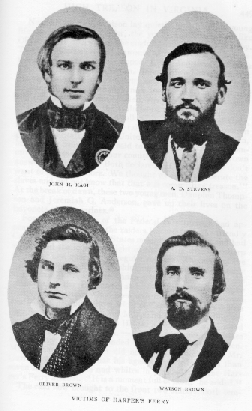
Thereupon, a Harper's Ferry man, James H. Holt, dashed into the river, gun in hand, to capture Copeland, who, as he approached him, made a show of fight by pointing his gun at Holt, who halted and leveled his; but, to the surprise of the lookers-on, neither of their weapons were discharged, both having been rendered temporarily useless, as I afterward learned, from being wet. Holt, however, as he again advanced, continued to snap his gun, while Copeland did the same.
Reaching the rock, Holt clubbed his gun and we expected to see a hand to hand fight between them; but the mulatto, showing the white feather, flung down his weapon and surrendered. Copeland, when he was brought ashore, was badly frightened, and well he might be in the midst of the excited crowd who surrounded him, some of whom began to knot their handkerchiefs together, with ominous threats of "Lynch law." But better counsels prevailed, and he was taken before a magistrate, who committed him to jail to await his trial.
When I returned to my former place of observation on High street, the expected reinforcements from Martinsburg and Shepherdstown had arrived, as also a small body of cavalry under Lieutenant Hess, the latter of whom (dismounted) were, with the Shepherdstown company, posted on Shenandoah street near the armory gate at the lower or eastern end of the grounds,while the men from Martinsburg and those under Roderick prepared to charge the raiders from the upper or western end.
The charge, which I witnessed, was spirited and made in the face of the concentrated fire of Brown's party, who were forced to retreat into the engine-house near the armory gate, where nine or ten of the most prominent of the prisoners had been previously placed by Brown as hostages for his own safety and that of his companions. Watson Brown was wounded when this charge was made, also several of the citizens, among whom was a gallant young man by the name of George Wollet, whom I particularly noticed among the foremost of the Martinsburg men until he was disabled by a shot in his wrist. A young lawyer, also from Martinsburg, George Murphy, was wounded in the leg, and an old gentleman of the county, Mr. Watson, who was seventy-five years of age, had the stock of his gun shattered as he raised it to his shoulder to shoot. Thomas P. Young, of Charlestown, who was permanently disabled during the day, got his wound, too, I think, in this charge; but of this I am not so certain.
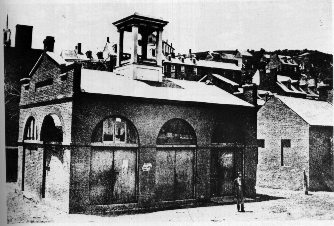
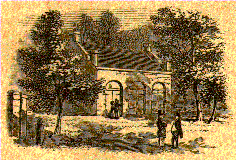
Brown, having now barricaded himself and prisoners in the engine-house,-a small but substantial building of brick, still standing,- said to "Phil," one of Alstadt's kidnapped servants, " You're a pretty stout-looking fellow; can't you knock a hole through there for me?" at the same time handing him some mason's tools with which he compelled him to make several loopholes in the walls through which to shoot. He also fastened, with ropes, the large double door of the house so as to permit its folding leaves (which opened in- ward) to be partly separated so that he might fire through that opening.
These arrangements having been hurriedly made, Brown and his men opened an indiscriminate fire upon the citizens. While they were thus shooting at every one they saw without regard to his being armed or not, Mr. Fountain Beckham, station agent, who was then mayor of the town, happened to walk out upon the depot platform near his office; when, incautiously exposing himself, he was instantly shot down, though it was evident he was unarmed, as he had his hands in his pockets at the time. This was the fourth victim of the foray.
When Mr. Beckham's friends upon the platform saw him fall dead in their presence,- shot through the heart without a word of warning,-killed without having taken any part in the fight, notwithstanding the special provocation he had received that morning in having his favorite servant murdered by the men who had now caused his own death,- their rage became uncontrollable, and they impulsively rushed into the railroad hotel to take summary vengeance on the prisoner, Thompson, who was confined there. But the lady of the house, Miss Christine C. Fouke, a most estimable woman, placing herself in front of the prisoner, declared that as long as he was under the shelter of her roof she would protect him, with her life, from harm,-which for a time saved the prisoner from death. But the respite was a brief one, for the maddened crowd soon brought him forth upon the platform where he was immediately shot, and his body thrown over the parapet of the bridge into the river below.
One of the raiders, Leeman, was discovered trying to escape across the river; and having been fired on and wounded, an excited volunteer from Martinsburg waded out to where he was in the water and killed him, it was said, after he had surrendered.
Shortly after, the charge was made whichr brought Brown to bay in the engine-house;: and while I was yet standing at the point on High street whence I had witnessed the fight, where there was an unobstructed view across the river, I heard the hum of a ball as it went singing by me, and presently it was followed by another which passed in unpleasant proximity to my head. There were several persons with me at the time who were armed and who, discovering by the smoke that the shots, so evidently meant for ourselves, had come from a clump of small trees on the mountain side across the river, fired a volley in that direction which silenced the unseen marksman. I refer to this trifling incident only because it was mentioned by Cook in his "Confession," as follows:
"I saw," said he, "that our party were completely surrounded, and as I saw a body of men on High street firing down upon them, though they were about half a mile distant from me, I thought I would draw their fire -upon myself; I therefore raised my rifle and -took the best aim I could and fired. It had the desired effect, for the very instant the party retumed it. Several shots were exchanged. The last one they fired at me cut a small limb I had hold of just below my hand, and gave me a fall of about fifteen feet, by which I was severely bruised, and my flesh somewhat lacerated."
It was now near nightfall, and the gathering gloom of a drizzly evening began to obscure surrounding objects, making it so difficult to distinguish them that, as if by common consent on both sides, active operations were suspended.
At this time a conference was held by three or four of the principal officers in command, to which two or three civilians, including myself, were invited,-the object of the consultation being to determine whether or not to take the engine-house by assault at once, or to wait until morning.
It was represented to us by the prisoners whom Brown had released, when he selected out of their number nine or ten to be held as hostages in the engine-house, that, if an attempt should be made to carry it by storm at night, it would be impossible to distinguish the hostages from the insurgents; and that Brown would probably place the former in fron of his own party as a protection, and thereby cause them to receive the brunt of the attack.
It was also urged that the raiders were then as securely imprisoned in their place of refuge as if incarcerated in the county jail and could be taken in the morning withou much risk to our friends. Before deciding the question under consideration, it was thought proper, at any rate, to send Brown a summons to surrender, and a respectable farmer of the neighborhood, Mr. Samuel S----- was selected to make the demand,-a duty which he undertook very willingly, although it was not unattended with danger, as the usages of ordinary warfare had been more than once disregarded, during the day, by the belligerents on both sides. Mr. S. was man of indomitable energy, undoubted courage, and of such a genial disposition as to make him a general favorite; but he was somewhat eccentric and so fond of using sesquipedalia verba that, occasionally, he was betrayed thereby into those peculiarities of speech which characterized the conversation of Mrs. Malaprop.
Tying a white handkerchief to the ferrule of a faded umbrella, he went forth upon his mission with a self-imposed gravity becoming his own appreciation of its importance.
Marching up to the door of the enginehouse, he called out in stentorian tones.
"Who commands this fortification?"
"Captain Brown, of Kansas," was the answer, from within the building.
"Well, Captain Brown, of Kansas," continued Mr. S., with his voice pitched in the same high key, "I am sent here, sir, by the authorities in command, for to summon you to surrender; and, sir, I do it in the name of the Commonwealth of old Virginia-God bless her!"
"What terms do you offer?" inquired Brown.
"Terms!" exclaimed S. "I heard nothing said about them, sir, by those who sent me. What terms do you want?"
"I want to be allowed," said Brown, "to take my men and prisoners across the bridge to Maryland and as far up the river as the lock-house [which was about a mile above] where I will release the prisoners unharmed, provided no pursuit shall be made until I get beyond that point."
To which S. replied by saying:
"Captain, you'll have to put that down in writing."
"It's too dark to write," answered Brown
"Pshaw !" said S.; " that's nonsense,--for you needn't tell me that an old soldier like you hasn't got all the modern conveniences. So, if you don't write your terms down, in black and white, I wont take 'em back to those who sent me."
Thereupon, a light was struck in the engine-house, and presently a piece of paper was handed out to S., on which Brown had written what he wished to have accorded him.
The proposed terms were, of course, inadmissible; and after the paper containing them had been read by two or three of us it was handed to Lawson Botts, who threw it contemptuously upon the floor, and placing his foot on it, said:
"Gentlemen, this is adding insult to injury. I think we ought to storm the engine-house, and take those fellows without further delay."
But the representations of the released prisoners, already mentioned, caused the contemplated assault to be postponed for the night.
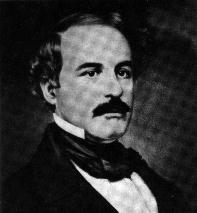 Robert E. Lee
Robert E. Lee 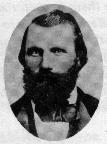 J.E.B.
Stuart
J.E.B.
Stuart
The next morning the first thing I learned was that Colonel Robert E. Lee and Lieutenant J. E. B. Stuart (both of whom subsequently gained fame as Confederate leaders) had arrived about midnight with a small body of marines from Washington, and that Colonel Lee had assumed command of all the forces assembled in the place. Having the pleasure of his acquaintance, I lost no time in calling upon him, when he informed me that he intended at once to take Brown and his party. Accordingly, at about seven o'clock, a detachment of marines -three of whom had heavy sledge-hammers-were marched up to the west end of the " watch-house" which hid them from the insurgents, and which was under the same roof as the engine-house, being separated from it only by a brick partition. Colonel Lee himself (who was not in uniform) took a position outside of the armory gate, within thirty paces of the engine-house, but protected from those within it by one of the heavy brick pillars of the railing that surrounded the inclosure.
All now being in readiness, Colonel Lee beckoned to Stuart, who, accompanied by a citizen displaying a flag of truce, approached the engine-house.
A parley then ensued between Stuart and Brown, which was watched with breathless interest by the crowd.
Although from the position I occupied (which was, probably, some sixty paces from the engine-house) I could not hear the conversation between them, I often afterward heard it detailed by Stuart, when sharing his tent or sitting with him by his camp fire, and therefore am enabled to confirm the correctness of the report of it, made by my friend and former comrade, Major John Esten Cooke, in a graphic account given by him. Stuart began by saying:
"You are Ossawattomie Brown, of Kansas?"
"Well, they do call me that sometimes, Lieutenant," said Brown.
"I thought I remembered meeting you in Kansas," continued Stuart. "This is a bad business you are engaged in, Captain. The United States troops have arrived, and I am sent to demand your surrender."
"Upon what terms?" asked Brown.
"The terms," replied Stuart, "are that you shall surrender to the officer commanding the troops, who will protect you and your men from the crowd, and guarantee you a fair trial by the civil authorities."
"I can't surrender on such terms," said Brown; "you must allow me to leave this place with my party and prisoners for the lock-house on the Maryland side. There I will release the prisoners, and as soon as this is done, you and your troops may fire on us and pursue us."
"I have no authority to agree to such an arrangement," said Stuart, "my orders being to demand your surrender on the terms I have stated."
"Well, Lieutenant," replied Brown, "I see we can't agree. You have the numbers on me, but you know we soldiers are not afraid of death. I would as leave die by a bullet as on the gallows."
"Is that your final answer, Captain?" inquired Stuart.
"Yes," said Brown
This closed the interview. Thereupon Stuart bowed, and as he turned to leave made a sign, previously agreed upon, to Colonel Lee, who immediately raised his hand, which was the signal of assault. Instantly the storming party under Lieutenant Green, consisting of a dozen marines, sprang forward from behind the angle of the wall that had concealed them, and for perhaps two minutes or more the blows of the sledge-hammers on the door of the engine-house sounded with startling distinctness, and were reechoed from the rocky sides of the lofty mountains that rose in all their rugged majesty around us.
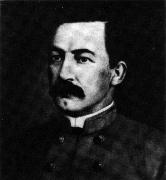 Lt. Israel Green
Lt. Israel Green
As yet, to our surprise, there was no shot fired by the insurgents, nor any sound heard from within the engine-house. Unable to batter down its doors, the men with the sledges threw them aside, at a sign from Stuart, and withdrew behind the adjoining building. Then there was a brief pause of oppressive silence, as some twenty-five or thirty more marines were seen coming down the yard with a long ladder that had been leaning against one of the shops. Nearing the engine-house they started into a run, and dashed their improvised battering ram against the door with a crashing sound, but not with sufficient force to effect an entrance.
Falling back a short distance they made another run, delivering another blow, and as they did so a volley was fired by the conspirators, and two of the ma- rines let go the ladder-both wounded and one of them mortally. Two others quickly took their places, and the third blow, splintering the right-hand leaf of the door, caused it to lean inward sufficiently to admit a man. Just then Lieutenant Green, who had been standing close to the wall, sword in hand, leaped upon the inclining door-leaf, which, yielding to his weight, fell inside and he himself d isappeared from our view in the interior of the building. There was a shot, some inarticulate exclamations, and a short struggle inside the engine-house, and then, as our rescued friends emerged from the smoke that filled it, followed by marines bringing out the prisoners, the pent-up feelings of the spectators found appropriate expression in a general shout.
As Colonel Lewis Washington came out I hastened to him with my congratulations, and to my inquiry:
"Lewis, old fellow, how do you feel?"
He replied, with characteristic emphasis:
"Feel! Why, I feel as hungry as a hound and as dry as a powder-horn; for, only think of it, I've not had anything to eat for forty odd hours, and nothing better to drink than water out of a horse-bucket!"
He told me that when Lieutenant Green leaped into the engine-house, he greeted him with the exclamation: "God bless you, Green! There's Brown!" at the same time pointing out to him the brave but unscrupulous old fanatic, who, having discharged his rifle, had seized a spear, and was yet in the half-kneeling position he had assumed when he fired his last shot. He said, also, that the cut which Green made at Brown would undoubtedly have cleft his skull, if the point of his sword had not caught on a rope, which of course weakened the force of the blow; but it was sufficient to cause him to fall to the floor and relax his hold upon the spear, which, by the way, I took possession of as a relic of the raid.
Within the engine-house one of Brown's party was found lying dead on the floor, and another (Watson Brown) was stretched out on a bench at the right-hand side of the door, and seemed to be in a dying condition. John Brown himself had been brought out and was then Iying on the grass; but so great was the curiosity to see him that the soldiers found some diffculty in keeping back the crowd, and Colonel Lee consequently had him removed to a room in an adjoining building, strictly guarded by sentinels, where, shortly afterward, I had an interview with him, the particulars of which have remained distinctly impressed upon my memory.
On entering the room where he was I found him alone, lying on the floor on his left side, and with his back turned toward me. The right side of his face was smeared with blood from the sword-cut on his head, causing his grim and grizzly countenance to look like that of some aboriginal savage with his war-paint on. Approaching him, I began the conversation with the inquiry:
"Captain Brown, are you hurt anywhere except on your head?"
"Yes, in my side,-here," said he, indicating the place with his hand.
I then told him that a surgeon would be in presently to attend to his wounds, and expressed the hope that they were not very serious. Thereupon he asked me who I was, and on giving him my name he muttered as if speaking to himself:
"Yes, yes,-I know now,-member of Congress-this district."
I then asked the question:
"Captain, what brought you here?"
"To free your slaves," was the reply.
"How did you expect to accomplish it with the small force you brought with you?"
"I expected help," said he.
"Where, whence, and from whom, Captain, did you expect it?"
"Here and from elsewhere," he answered.
"Did you expect to get assistance from whites here as well as from the blacks?" was my next question.
"I did," he replied.
"Then," said I, "you have been disap- pointed in not getting it from either?"
"Yes," he muttered, " I have-been- disappointed."
I then asked him who planned his movement on Harper's Ferry, to which he replied: "I planned it all myself," and upon my remarking that it was a sad affair for him and the country, and that I trusted no one would follow his example by undertaking a similar raid, he made no response. I next inquired if he had any family besides the sons who had accompanied him on his incursion, to which he replied by telling me he had a wife and children in the State of New York at North Elba, and on my then asking if he would like to write to them and let them know how he was, he quickly responded:
"Yes, I would like to send them a letter."
"Very well," said I, "you will doubtless be permitted to do so. But, Captain," I added, "probably you understand that, being in the hands of the civil authorities of the State, your letters will have to be seen by them before they can be sent."
"Certainly," said he.
"Then, with that understanding," con- tinued I, " there will, I'm sure, be no objections to your writing home; and although I myself have no authority in the premises, I promise to do what I can to have your wishes in that respect complied with."
"Thank you-thank you, sir," said he, repeating his acknowledgment for the proffered favor and, for the first time, turning his face toward me.
In my desire to hear him distinctly I had placed myself by his side, with one knee resting on the floor; so that, when he turned, it brought his face quite close to mine, and I remember well the earnest gaze of the gray ye that looked straight into mine. I then remarked:
"Captain, we too have wives and children. This attempt of yours to interfere with our slaves has created great excitement, and naturally causes anxiety on account of our families. Now, let me ask you: Is this failure of yours likely to be followed by similar attempts to create disaffection among our servants and bring upon our homes the horrors of a servile war?"
"Time will show," was his significant reply. Just then a Catholic priest appeared at the door of the room. He had been administering the last consolations of religion to Quinn the marine, who was dying in the adjoining office; and the moment Brown saw him he became violently angry, and plainly showed, by the expression of his countenance, how capable he was of feeling "hatred, malice, and all uncharitableness."
"Go out of here-I don't want you about me-go out!" was the salutation he gave the priest, who, bowing gravely, immediately retired. Whereupon I arose from the floor, and bidding Brown good-morning, likewise left him.
In the entry leading to the room where Brown was, I met Major Russell, of the marine corps, who was going in to see him, and I detailed to him the conversation I had just had. Meeting the major subsequently he told me that when he entered the apartment Brown was standing up-with his clothes unfastened -examining the wound in his side, and that as soon as he saw him he forthwith resumed his former position on the floor; which incident tended to confirm the impression I had already formed, that there was a good deal of vitality left in the old man, notwithstanding his wounds,-a fact more fully developed that evening after I had left Harper's Ferry for home, when he had his spirited and historic talk with Wise, Hunter, and Vallandigham.
Between the time of his raid and his execution I saw Brown several times, and was sitting near him in the court-room when sentence of death was pronounced upon him, during which he was apparently the least interested person present. Of course, I did not witness his execution, as I had seen quite enough of horrors at Harper's Ferry, little dreaming of those, ten thousand times more terrible, which I was yet to witness as among the results of the John Brown raid.
Alexander R. Boteler
In its original publication, in the Century Magazine, Boteler's recollections were followed by a response from F. B. Sanborn, one of Brown's oldest friends and supporters.